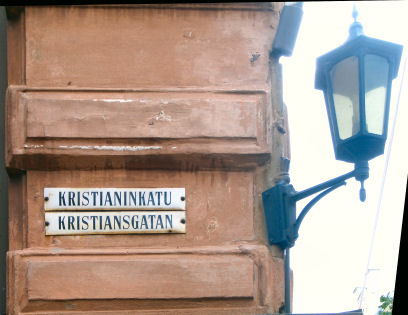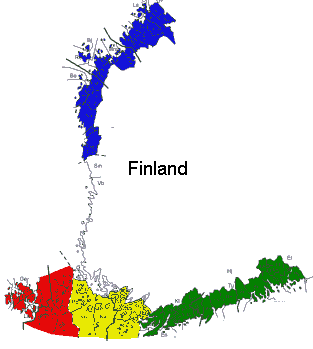Swedish, Helsingfors
Conjugate VerbsFacts
- Language: Swedish, Helsingfors
- Alternate names: Helsingforssvenska
- Language code: dsweh
- Language family: Indo-European, Classical Indo-European, Germanic, Northwest Germanic, North Germanic, North Scandinavian, East-Central Swedic, East Swedic
- Dialect of: Swedish
- Number of speakers: 35451
- Script: Latin script
More information:
Introduction

All street names are both in Finnish and Swedish.
Helsingfors Swedish (Swedish helsingforssvenska) is a East-Swedish dialect spoken in Helsinki (Swedish Helsingfors) region in Finland. This dialect has many borrowings from the Finnish language.
The verb

Swedish, Helsingfors is spoken in the middle of the area marked in Green.
Compared with Standard Swedish, the verb shows few peculiarities in conjugation. The differences between Standard Swedish and the dialects are rather in vocabulary that's specific to the region.
Morphology
The foremost peculiarity in morphology is the replacing of '-t/-d' with 'i' in past participle in 2nd and 3rd
conjugation verbs.
Examples:
- höri instead of hört, from höra 'to hear'.
- räcki instead of räckt, from räcka 'to last'.
There's also the tendency to omit the '-de' and '-t' suffixes in past tense and the supine. This is more common in Finland than in Sweden. Examples:
| Inflection | Finland | Sweden |
| Past | kalla´ called | kallade |
| Supine | kalla´ called | kallat |
| Supine | äti´ eaten | ätit |
One innovation is the infinitive måsta must. This verb has no infinitive in standard Swedish.
Vocabulary
Dialectal forms
- jåma (Standard Swedish 'tjata') ''
- skrinna (Standard Swedish 'åka skridsko') 'to skate'. "This verb is conjugated as a strong (irregular) verb in Southern Finland, and regularly in other Swedish speaking areas of Finland." (Source: Research Institute for the Languages of Finland)
Loans from Finnish verbs
- doka from Finnish dokata (Standard Swedish 'supa') 'to get drunk'
- dona from Finnish duunata (Standard Swedish 'arbeta') 'to do; to work'
- hassa from Finnish hassata (Standard Swedish 'slösa') 'to waste'
- lunta from Finnish luntata (Standard Swedish 'fuska') 'to cheat'
External Links
References
- Bergroth, Hugo. Finlandsvenska. Helsinki, 1928.